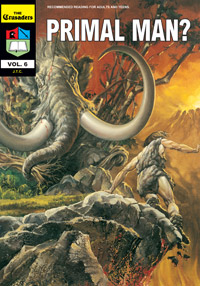How Scientific is the Big Bang?
- Issue Date: September/October 2007
By Thomas Heinze
The Big Bang is the idea that "nothing" exploded and formed everything: the elements, galaxies, solar systems, the earth, and even complex molecules which eventually came together to form life. Atheists use it to explain how things originated without God. Because wars use explosions, we know a lot about them. Real explosions don`t make things, they break things. They don`t bring forth greater organization, but disorganization.
Those who don`t believe that God had a hand in creation, have faith that the Big Bang did just the opposite of what all observed undirected explosions have done. An undirected explosion blows matter out more or less equally in all directions. This could not have formed stars organized into solar systems and galaxies, nor have put the galaxies in clusters.
Big Bang theory is not only contrary to common knowledge about explosions, but also contrary to some of the most basic laws of science. Here are a few:
- The First Law of Thermodynamics says that matter and energy are conserved. You can`t get something from nothing.
- Law of Conservation of Energy: The amount of energy remains constant. It cannot be created or destroyed.
- Law of Conservation of Mass: Mass is neither created nor destroyed.
Narlikar, a scientist, has dared to point this out about the Big Bang: "...as a theory of physics, it breaks a cardinal rule by violating the law of conservation of matter and energy" Many atheists understand that the laws of science would not have permitted the Big Bang. So, they suggest that these laws must not have been in effect at the time of the Big Bang. Their faith that God did not create is greater than their faith in science. Because breaking the basic laws of science seems impossible, some atheists feel that the Big Bang did not make matter out of nothing, but that a tiny point of mass already existed.
If this is true, why did it suddenly explode and expand? This would have violated Newton`s Law of Inertia: "The tendency of matter to remain at rest if at rest, or if moving to keep moving in the same direction unless affected by some outside force." The militant atheist, Richard Dawkins, criticized the miracles of the Bible: "Every one of these miracles amounts to a violation of the normal running of the natural world." So does the Big Bang!
Instead of discarding the Big Bang because the laws of science would not permit it, whenever another law of science is found to have been breached, another patch is added to Big Bang theory. Therefore, a knowledgeable and faithful Big Bang believing atheist or agnostic must believe more than just that the Big Bang is the way that nothing, for no reason, made everything out of nothing, or next to nothing. He must also have faith in the patches.
I too believe a miracle occurred, but "nothing" didn`t do it. God did! He who has the power and intelligence to create, explained in His word, the Bible: "In the beginning, God created the heavens and the earth." (Genesis 1:1)
Other Articles from September/October 2007:
- Preachers claim, "I've Never Seen a Bible"
- 'Christian' Bookstores Are Disappearing
- Pope Reaffirms 'No Salvation' Outside Catholic 'Church'
- Don't Hide This Halloween
- Courageous Christian Students
Fighting Back
- A Message From Jack Chick
- Chick Mail Bag - September 2007
- Muslims Pay a High Price for Accepting Christ
- Prison Ministry Letters: Sep-2007
- Modern 'Tolerance' Does Not Include Bible Believers
More on Evolution:
Products of Interest:

Big Daddy?
A student proves evolution is full of holes.-

Primal Man?
32-PAGE, FULL COLOR COMIC BOOK - This story proves evolution is impossible. Connelly says he is convinced, but keeps producing evolution films. You will learn why.
-

Vanishing Proofs of Evolution, The
96 pages
Are your children being taught scientific "proofs" of evolution that have already been disproven? -

Evolution Handbook, The
600 pages
Most complete refutation of evolution available in a single book. Carefully written in simple language for 7th grade on up.



